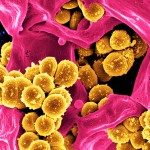Link to Pubmed [PMID] – 19476511
Immunology 2009 Jun;127(2):155-62
Significant progress has been made during the past years in our understanding of the mechanisms that control the differentiation of naïve CD4(+) T cells into effector T-cell subsets with distinct functional properties. Previous work allowed the identification of key molecules involved in regulating this highly complex process, such as cytokines and their receptors, signal transducers and transcription factors. More recently, the emphasis of research in this field has been to elucidate how the multiplicity of signals is integrated to shape a T helper subset-specific gene-expression program controlling differentiation and effector functions. In this review we will highlight advances that have been made in unravelling the genetic and epigenetic networks controlling differentiation of naïve CD4(+) T cells into interferon-gamma(IFN-gamma)-secreting T helper type 1 (Th1) cells.
